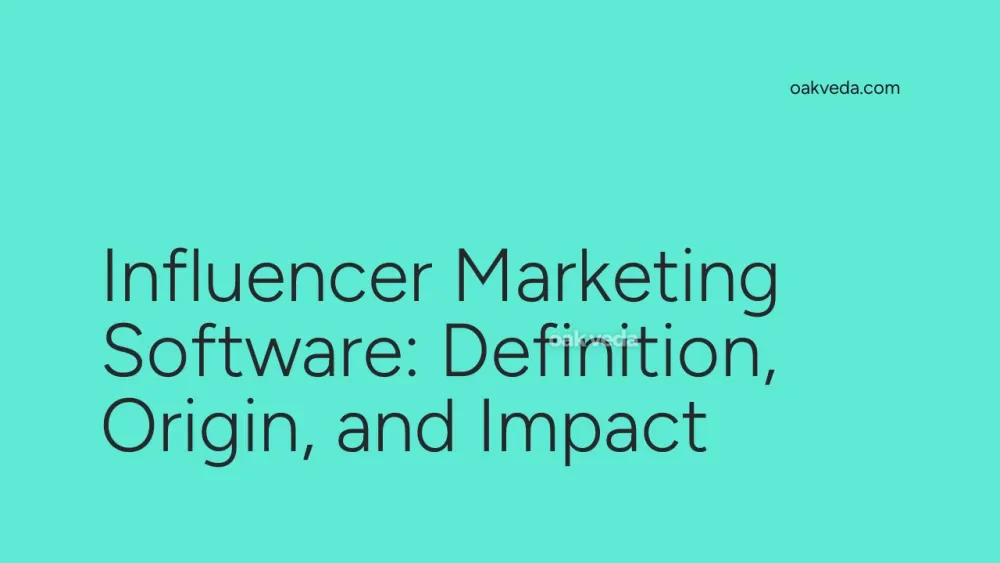
What is Influencer Marketing Software?
Influencer marketing software refers to specialized digital tools and platforms designed to facilitate, streamline, and optimize influencer marketing campaigns. These powerful solutions help brands and marketers efficiently manage various aspects of influencer collaborations, from identifying suitable partners to tracking campaign performance and measuring return on investment (ROI).
Origin and Development of Influencer Marketing Software
The rise of influencer marketing software coincides with the explosive growth of social media influencers and the increasing recognition of their impact on consumer behavior. As brands began to realize the potential of influencer partnerships, the need for tools to manage these relationships became apparent.
Early influencer marketing efforts were often manual and time-consuming, involving spreadsheets and direct outreach. However, as the industry matured, sophisticated software solutions emerged to address the complexities of influencer campaigns at scale.
How Influencer Marketing Software Works
Influencer marketing software typically offers a comprehensive suite of features designed to support the entire influencer marketing process:
-
Influencer Discovery: Advanced search and filtering tools to identify relevant influencers based on criteria such as niche, audience demographics, engagement rates, and platform presence.
-
Campaign Management: Tools for planning, executing, and monitoring multiple influencer campaigns simultaneously.
-
Communication: Built-in messaging systems to facilitate direct communication between brands and influencers.
-
Content Approval: Workflows for reviewing and approving influencer-created content before publication.
-
Performance Tracking: Real-time analytics and reporting features to measure campaign success across various metrics.
-
Payment Processing: Automated systems for managing influencer compensation and payouts.
-
Compliance Monitoring: Tools to ensure influencer content adheres to legal requirements and platform guidelines.
Types of Influencer Marketing Software
Influencer marketing software can be categorized into several types based on their primary focus:
- All-in-One Platforms: Comprehensive solutions that cover the entire influencer marketing process.
- Influencer Discovery Tools: Specialized in finding and vetting potential influencers.
- Campaign Management Systems: Focused on planning and executing campaigns.
- Analytics and Reporting Tools: Emphasize performance measurement and ROI calculation.
- Influencer Relationship Management (IRM) Platforms: Designed to nurture long-term relationships with influencers.
Popular Examples of Influencer Marketing Software
Several leading platforms have emerged in the influencer marketing software space:
- Later Influence: Offers a vetted influencer database, in-house campaign management, automated payouts, and real-time analytics.
- AspireIQ: Provides AI-powered influencer discovery and campaign management tools.
- Grin: Focuses on e-commerce integration and end-to-end relationship management.
- Upfluence: Known for its large influencer database and advanced search capabilities.
- CreatorIQ: Emphasizes data-driven insights and enterprise-level campaign management.
Impact of Influencer Marketing Software on Social Media Culture
Influencer marketing software has significantly transformed the social media landscape:
-
Professionalization of Influencer Marketing: These tools have helped establish influencer marketing as a legitimate and measurable marketing channel.
-
Democratization of Brand Partnerships: Smaller brands can now access and manage influencer relationships more easily, leveling the playing field.
-
Data-Driven Decision Making: Marketers can make more informed choices about influencer partnerships based on concrete metrics.
-
Increased Transparency: Many platforms provide verified engagement rates and audience demographics, reducing fraud and improving authenticity.
-
Streamlined Collaborations: Efficient communication and workflow tools have made brand-influencer partnerships smoother and more productive.
How Brands and Influencers Use Influencer Marketing Software
Brands leverage influencer marketing software to:
- Identify ideal influencers aligned with their target audience and brand values
- Manage multiple campaigns across various platforms simultaneously
- Track ROI and adjust strategies based on real-time performance data
- Ensure compliance with advertising regulations and platform guidelines
Influencers use these platforms to:
- Showcase their metrics and audience demographics to potential brand partners
- Manage their content calendars and campaign deliverables
- Track their earnings and performance across multiple brand partnerships
Future Trends in Influencer Marketing Software
The influencer marketing software landscape continues to evolve, with several emerging trends:
- AI and Machine Learning: Advanced algorithms will improve influencer matching and predictive analytics.
- Integration with E-commerce: Closer ties between influencer content and direct purchasing capabilities.
- Micro and Nano-Influencer Focus: Tools tailored for managing larger numbers of smaller-scale influencers.
- Video and Live-Streaming Analytics: Enhanced capabilities for measuring performance on video-centric platforms.
- Blockchain for Transparency: Implementation of blockchain technology to verify engagement and reduce fraud.
FAQs about Influencer Marketing Software
-
Is influencer marketing software necessary for all brands? While not essential for every brand, it becomes increasingly valuable as influencer marketing efforts scale up.
-
How does influencer marketing software improve ROI? By providing data-driven insights, streamlining processes, and enabling more strategic influencer selections.
-
Can influencer marketing software prevent influencer fraud? Many platforms offer tools to detect potential fraud, but they should be used in conjunction with human oversight.
-
How do these platforms handle data privacy concerns? Reputable software adheres to data protection regulations and often provides transparency about data usage.
-
What's the learning curve for influencer marketing software? It varies by platform, but many offer user-friendly interfaces and training resources to ease adoption.
In conclusion, influencer marketing software has become an indispensable tool in the modern digital marketing landscape. As social media continues to evolve, these platforms will play an increasingly crucial role in helping brands harness the power of influencer partnerships effectively and efficiently.
You may be interested in:
- TBT: Definition, Origin, and Impact on Social Media Culture
- Fan-Girl: Definition, Origin, and Impact on Social Media
- Cross-Posting: Definition, Origin, and Impact on Social Media
- Bet: Definition, Origin, and Impact on Social Media
- Cheugy: Definition, Origin, and Impact on Social Media
- Finsta: Definition, Origin, and Impact on Social Media

